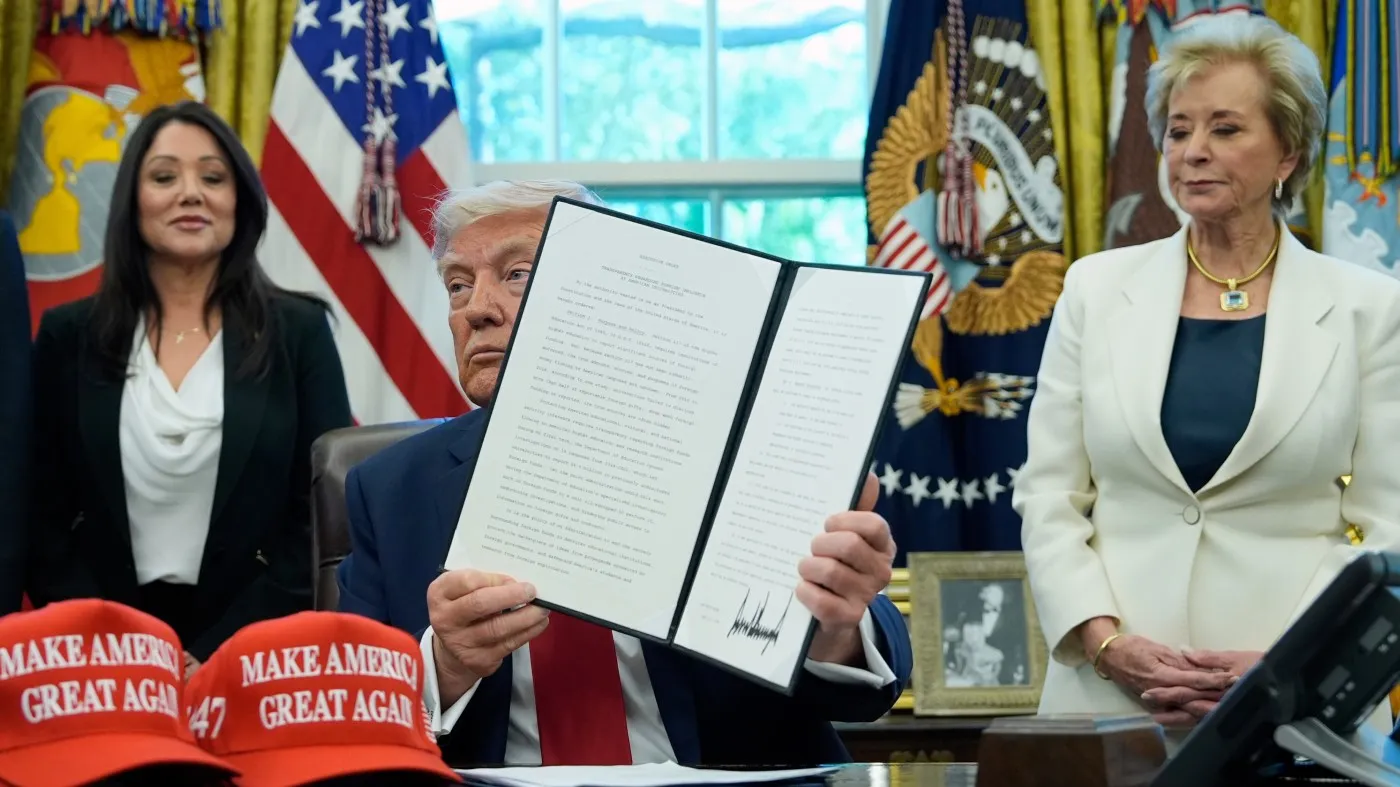President Trump Challenges Traditional Accreditation with New Executive Order
In an exclusive report, former President Donald Trump has made headlines once again as he prepares to sign an executive order aimed at reforming the college accreditation process in the United States. This new directive seeks to reshape how institutions of higher learning are evaluated and accredited, a move that many believe could have profound implications for the future of education in America.
The Purpose Behind the Executive Order
Traditionally, college accreditation is a process that ensures institutions meet certain educational standards, allowing them to receive federal funding and aid for students. However, Trump’s executive order will challenge the established norms of this process, arguing that the current system is plagued by inefficiencies and biases that hinder competition and innovation.
In a statement, Trump claimed, “Accreditors have too much power and too often stifle growth and freedom of thought on college campuses. My administration believes in the power of choice in education, and it’s time we put the power back into the hands of the students and institutions themselves.” This sentiment aligns with Trump’s ongoing critique of higher education policies that he perceives as overly restrictive.
What Changes are Anticipated?
The specifics of the executive order remain under wraps for the time being, but sources close to the former President suggest several key changes could be on the horizon:
- Reduction of Accrediting Agency Influence: Trump’s order is expected to reduce the influence that accrediting agencies have over colleges and universities. This could mean that colleges could seek alternative routes for accreditation, bypassing traditional bodies entirely.
- Increased Competition: By loosening restrictions on how colleges are accredited, Trump hopes to foster a more competitive environment, encouraging institutions to innovate and improve their offerings to attract students.
- Enhanced Student Choice: Highlighting the importance of individual student choice, the executive order aims to empower students to select programs and institutions that best meet their needs, even if those institutions do not hold traditional accreditation.
Reactions from the Education Community
The response from the education community has been mixed. Supporters of Trump’s initiatives argue that the current accreditation system often acts as a barrier to entry for new and innovative educational models that could better serve students. They argue that outdated standards are keeping alternative education models, such as online universities and competency-based education programs, from gaining traction.
On the other hand, critics warn that removing rigorous accreditation standards could lead to a dilution of educational quality. “Without proper oversight, we risk allowing subpar institutions to operate under the guise of legitimacy. Students deserve to know their investment in education is going toward reputable institutions,” said Dr. Janet Holtz, a leading voice in higher education advocacy.
Political Implications
This executive order also carries significant political implications, especially as Trump continues to position himself as a champion of conservative values in education. In recent months, he has garnered support from various factions of the GOP who are eager to dismantle perceived bureaucratic overreach in education.
As the 2024 election cycle approaches, this move could serve as a rallying point for his base. The education sector has increasingly become a battleground for political ideologies, with many conservatives arguing that liberal values dominate university campuses. Trump’s focus on education reform could help solidify his appeal among conservative voters.
Broader Impacts on Higher Education
The ramifications of this executive order could extend beyond what happens in individual colleges and universities. If successful, changes to the accreditation process could lead to a re-evaluation of what higher education means in America.
As institutions scramble to adapt, we may see an increase in alternative educational models that cater to the nontraditional student demographic, including working professionals and adult learners. Additionally, this shift could result in an expansion of vocational training programs as colleges look to diversify their offerings to appeal to a broader audience.
University Response
Major universities across the country are already responding to the news of Trump’s impending executive order with caution. Many are reviewing their accreditation status and discussing potential adaptations to their programs in order to maintain relevance in a rapidly changing landscape. University of California President, Janet Napolitano, stated: “We will continue to uphold our commitment to academic excellence and ensure our accreditation bodies meet the rigorous standards desired by students and families.”
In a similar vein, leaders at community colleges across the nation are providing resources to help students navigate educational options, ensuring they have access to quality education regardless of potential changes in the accreditation process.
The Future of Accreditation
As discussions surrounding Trump’s executive order unfold, the future of college accreditation in the United States hangs in the balance. Will this move lead to an era of innovation and enhanced access to diverse educational models, or will it open the floodgates for a wave of institutions lacking in substance and quality? Only time will tell.
Conclusion
There is no denying that Trump’s executive order stands to change the landscape of higher education in America. As the debate surrounding accreditation heats up, stakeholders at all levels—from students to educators to policymakers—will need to tread carefully, balancing the need for innovation and accessibility with a commitment to educational integrity and quality.
As this story develops, one thing is certain: the role of accreditors and how we measure the value of a college education will be at the forefront of discussions leading into the next presidential election cycle and beyond. With heightened scrutiny on the education sector, the implications of this executive order will reverberate through our academic institutions for years to come.







